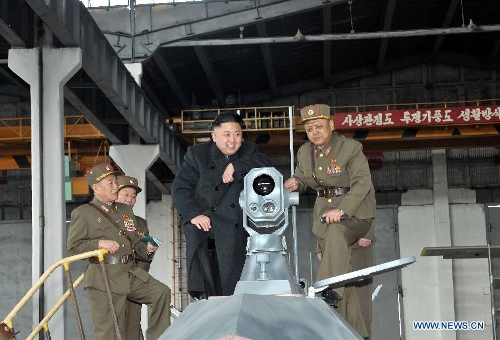Korean tensions may hit breaking point

North Korea's third nuclear test in February has greatly intensified the confrontation between Pyongyang and the international community. As the North has declared invalid the Korean Armistice Agreement that ended the Korean War in 1953, the situation in the Korean Peninsula has reached its most hazardous point in 60 years.
The reason that the situation has evolved to such point is that North Korea's aims in its nuclear test will not be accepted by the US, Japan, South Korea and other countries. The third test has changed the essence of the North Korean nuclear issue and pushed the nations involved toward an ultimate showdown.
The North's third nuclear test has enabled the country to acquire the capability of launching a nuclear offensive. If its previous two explosions were only nuclear devices, its third test involves nuclear missiles, which is a major step in the North's nuclear ambitions. This has brought a real threat to its neighboring countries and the US.
Analysts estimated that North Korea has probably made and exploded a uranium bomb. If this proves true, it means that the North has the capability to make uranium bombs through enrichment, which is a step further than extracting plutonium from reactors. It's alleged that the North could produce as many as five to six concealed nuclear bombs every year, and the outside world can hardly trace its moves.
There are rumors that North Korea has cooperated with Syria and Iran over nuclear technology. According to some reports in the US media, Iran has outsourced its nuclear program to North Korea.
The authenticity of such reports remains to be proved. But if it is true, it means that North Korea is not only involved in nuclear proliferation, but also has conducted the world's first commercially orientated nuclear test. We cannot underestimate the effects of this test.
North Korea wants to use its third nuclear test to end the dispute over its nuclear issue and gain leverage to force countries concerned to admit its nuclear status.
Before its nuclear test, the North's Ministry of Foreign Affairs and the National Defense Commission announced that the Six-Party Talks and 9.19 Joint Statement would no longer exist. They said the North would never talk on denuclearization.
On the very day of the nuclear test, a spokesman for North Korea's Ministry of Foreign Affairs said the US should either "respect the DPRK's right to satellite launch and open a phase of detente and stability or to keep to its wrong road leading to the explosive situation by persistently pursuing its hostile policy toward the DPRK."
The North believes that the US has no intention to start a war against it. Even if the US does, China will object to it, and the US may not risk confrontation with China.
The North hopes that in China, those who still stick to a Cold War mentality will prevent the government from shifting its North Korean policies and that both the US and China can only compromise in wake of the North's provocations.
The sanctions posed by the UN Security Council Resolution 2094 are still constrained to economic and political ones, which exclude military ones.
The resolution is more like a guarantee that frees the North from being attacked. However, the North still reacted fiercely.
The North Korea proclaimed another Korean war unavoidable and called for mobilization for war. It probably wanted to threaten concerned countries and force them into silence. Besides, being a nuclear state could boost the North's confidence in its fantasies of a North-led unification.
The "holy war of reunification" has become one of the most frequently used terms in North Korean politics in recent years. If such a war becomes reality, the situation in the Korean Peninsula will be really explosive.
The author is a professor at the Party School of the Central Committee of CPC. opinion@globaltimes.com.cn